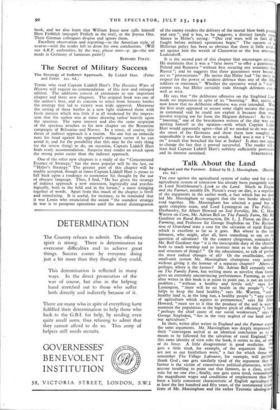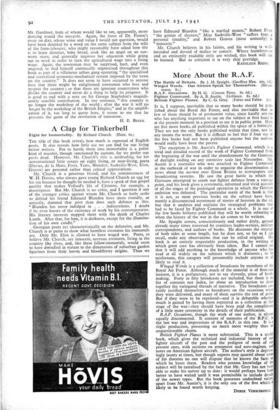Talk About the Land
England and the Farmer. Edited by H. J. Massingham. (Bats los. 6d.)
THE case against the agricultural system of today and for a n agricultural system of tomorrow has already been pungently sea in Lord Northboume's Look to the Land. Much in Engleu and the Fanner, notably Dr. Picton's essay on diet, is a repetiu of the arguments in the earlier work, a fact which has no dot led Mr. Massingham to suggest that the two books should read together. Mr. Massingham has selected a good but quite complete team, and Lord Lymington on The Policy Husbandry, Sir Albert Howard on Soil Fertility, Mr. C. He Warren on Corn, Mr. Adrian Bell on The Family Farm, Mr. It Gardiner on Rural Reconstruction, Dr. L. J. Picton on Diet at Farming, and Professor Sir George Stapledon on The Red tion of Grassland state a case for the salvation of rural Engla which is excellent as far as it goes. But where is the f labourer, who might, after all, have something to say on question of salvation? Or the country clergyman, reminded Mr. Rolf Gardiner that "it is the inescapable duty of the church both to teach worship and to instruct men as to the substan and structure of things?" Or the educationist, to talk of perha the most radical changes of all? Or the smallholder, wh small-unit system Mr. Massingham champions very ardent without giving it the honour of a separate chapter? Above a. perhaps, where is the farmer? Mr. Adrian Bell certainly wit on The Family Farm, but writing more as novelist than far= gives an extremely unconvincing performance. Farming, as wit after writer in this book is at pains to point out, is not an isolat problem ; "without a healthy and fertile soil," says LO Lymington, "there will be no health in the people "; "car helps to keep the land healthy," says Mr. Warren, "and healthy land is, in the long run, a healthy people "; "any syst of agriculture which aspires to permanence," says Sir Atha Howard, "must see to it that the produce of the soil is sure maintain the population at the highest pitch if efficiency "; last "perhaps the chief cause of our social weaknesses," says George Stapledon, "lies in the very neglect of our land and our agriculture."
In short, writer after writer in England and the Fanner repea the same arguments. Mr. Massingham was deeply impressed their "convergent arrival at an identical conclusion as to means to be followed for the salvation of rural England," this same identity of view robs the book, it seems to me, of SO of its force. A little disagreement is good medicine. gets a little tired, for example, of the argument that ` are not as our forefathers were," a fact for which those W remember The Village Labourer, for example, will probah. thank God ; one gets similarly tired of the argument that farmer is the victim of conservative political-plutocrats, with anyone troubling to point out that farmers, as a class, usuaL vote for no one else ; finally, one gets extra tired, remembe the magnificent wages and conditions of employment that ha been a fairly consistent characteristic of English agriculture at least the last hundred and fifty years, of the sentimental ini tions of Mr. Massingham and the rather Teutonic ideologies
Mr. Gardiner, both of whom would like to see, apparently, more dancing round the maypole. Again, the force of Dr. Picton's essay on diet, whose sense and value I would not question would have been doubled by a word on the same subject from the wife of the farm-labourer, who might reasonably have asked how she is to learn dietetics, bake bread, cook like an angel on an out- worn stove, and generally improve her education while going out to work in order to turn the agricultural wage into a living wage. Again, the townsman may be surprised, hurt, and even angered, to find himself continually stigmatised throughout this book as part of a villainous urban gang operating "the specialised and centralised economic-mechanical system imposed by the town on the country." It does not seem to have occurred to anyone here that there might be enlightened townsmen who love and respect the country ; or that there are ignorant countrymen who dislike the country and never do a thing to help its progress. It is good to end with a note on Sir George Stapledon's magnifi- cently sensible contribution. In one sentence, "this country is no longer the workshop of the world ; after the war it will no longer be the workshop of the British Empire," and in the amplifi- cation of it, too long to quote here, it seems to me that he presents the germ of the revolution of tomorrow.
H. E. BATES.



























 Previous page
Previous page